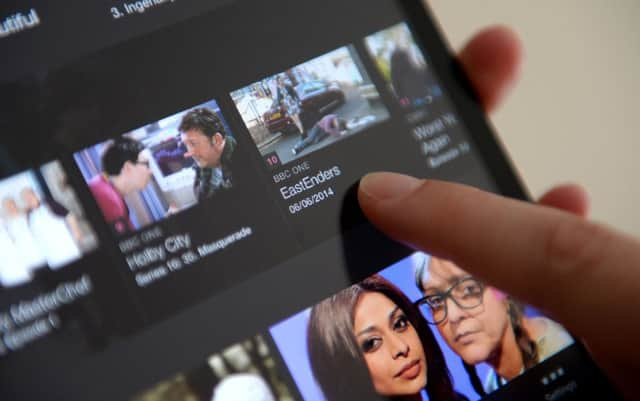Binge-watch, and every other word of the year from 2005 to now


Here we look at a decade of the Word of the Year to see how the new words entering both dictionaries and the way we speak have defined ourselves over time.
2014: Photobomb
Photobomb fended off competition from 50,000 new additions to the dictionary - including twerk, bakeoff and normcore - to take the word of the year title last year.


Advertisement
Hide AdCollins said the word, which had been used as far back as 2008, received a powerful endorsement after both Prince Harry and the Queen were pictured photobombing athletes at the Commonwealth Games in Glasgow.
The photobomb is officially defined by the Collins English Dictionary as “to intrude into the background of a photograph without the subject’s knowledge”.
Is it still used?
Yes – everyone seems to like a photobomb.
2013: Geek
Geek was chosen by Collins as a reminder of how and insult can be transformed into a badge of honour.
The publisher changed the main definition of geek from someone preoccupied with computing to “a person who is very knowledgeable and enthusiastic about a specific subject”, adding geekery, geek chic and geekdom to the fold. The Oxford dictionary chose selfie as its word of the year.
Is it still used?
Yes - and probably forever more.
2012: Omnishambles
Coined by everyone’s favourite PR man Malcolm Tucker, the use of omnishambles went beyond the preserve of the foulmouthed star of BBC comedy The Thick of It. Now it is formally described as a “situation that has been comprehensively mismanaged, and is characterised by a string of blunders and miscalculations”. From omnishamles sprang Romneyshambles, following Mitt Romney’s remarks that London may not be equipped to host a a successful Olympic Games, and omnivoreshambles, used to described the furore over badger culling south of the border.
Is it still used?
Far less common than it was, probably because Malcolm Tucker has left the building.
2011: Squeezed middle
Advertisement
Hide AdThe term was originally coined by Ed Miliband when speaking to BBC Radio 4’s Today Programme presenter John Humphrys.
The full Oxford English Dictionay definition reads: “Squeezed Middle: the section of society regarded as particularly affected by inflation, wage freezes and cuts in public spending during a time of economic difficulty, consisting principally of those on low or middle incomes”. Runners up included Arab Spring and hacktivism.
Is it still used?
Advertisement
Hide AdYes: it’s a piece of political parlance that many people understand.
2010: Big Society
The 2010 winner at Oxford dictionaries was a bit of a damp squib and probably didn’t enter common parlance in the same way that title contenders ‘double-dip’ and ‘vuvuzela’ had done. Still, it showed the power of political speak with Big Society coined by the-then Conservative-Liberal Democrat coalition to express its vision for more power for citizens and communities.
Is it still used?
It has evaporated, along with the coalition who created it.
2009: Simples
It may be grammatically incorrect but lexicographers at Oxford Dictionaries said the Compare The Meerkat campaign catchphrase had entered everyday language with such swiftness that it deserved the Word of the Year crown. Used to convey that something is very straightforward, simples beat off competition from jeggings - a cross between jeans and leggings - and defriend, a reference to deleting someone from your Facebook, to take the title.
Is it still used?
Rarely, possibly due to overuse (and it’s a bit irritating now).
2008: Credit crunch
First used in the 1960s, the term credit crunch was resurrected in 2008 as circumstances dictated. A worthy winner given the year will always be associated with the crash in the money markets and its knock-on effects. Several other finance related terms were picked up by Oxford Dictionaries during 2008, including ninja loan – a loan for someone with ‘no income, no job, no assets’ – and jingle mail, when keys are sent back to a mortgage company because of negative equity.
Is it still used?
it is, and it will no doubt be resurrected
2007: Carbon footprint
Carbon footprint is defined as the amount of carbon dioxide released into the atmosphere as a result of the activities of individuals, organisations, or community. It took the crown amid growing awareness of food miles and the environmental benefits of shopping and eating local. In the US, the word of the year title went to “locavore” – which isn’t used to same extent in the UK – but refers to the trend of using locally grown and seasonal ingredients
Is it still used?
Advertisement
Hide AdYes, possibly even moreso due to greater awareness of carbon-related issues.
2006:Bovvered
Once the gem of youthspeak created by Catherine Tate, and then heard just about everywhere. From the mouth of Tate’s creation Lauren Cooper, bovvered, as in: “does my face look bovvered?” was picked up by the nation and the very teens she sought to characterise.
Advertisement
Hide AdSuch was its cultural currency that tabloid headlines galore and greetings cards were born out of bovvered. When Tate performed at the first Royal Variety in Wales she inquired of the monarch, “Is one bovvered?”. The Queen, of course, did not reply. Even Tony Blair got in the act.
Is it still used?
Rarely, but it was fun while it lasted.
2005: Sudoku
The Japanese logic puzzle took Britain by Britain by storm with lexicographers hailing how the word took a fraction of time to establish itself when compared to just 10 years ago. It took the title to illustrate how the English language was evolving due to multicultural influences.
Is it still used?
It’s still as popular as ever.